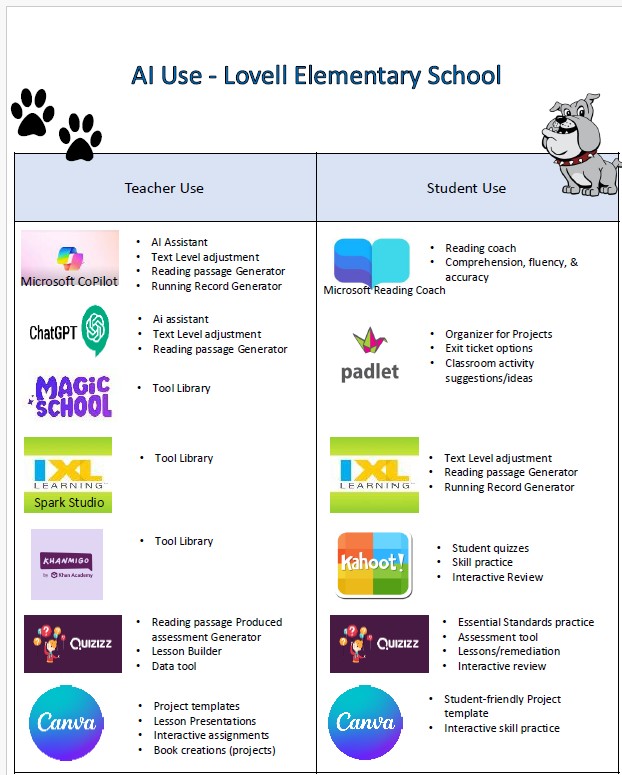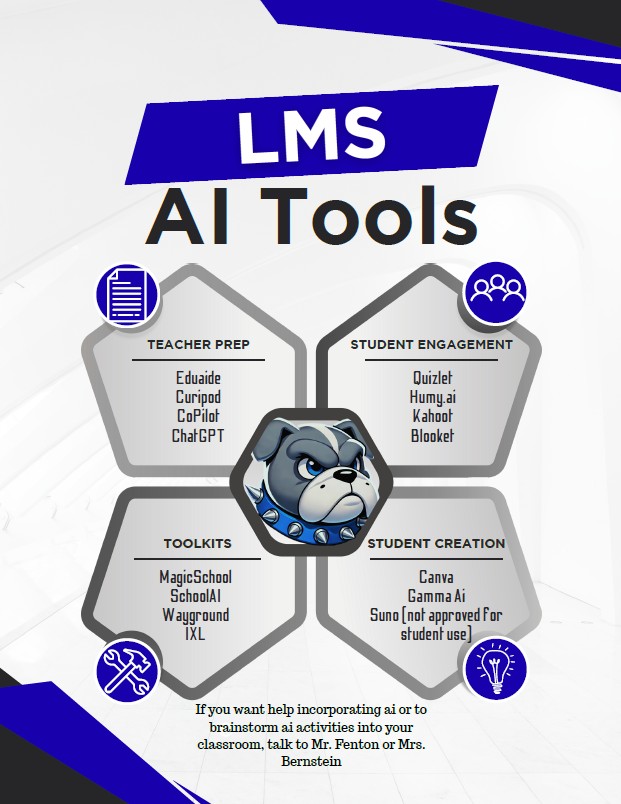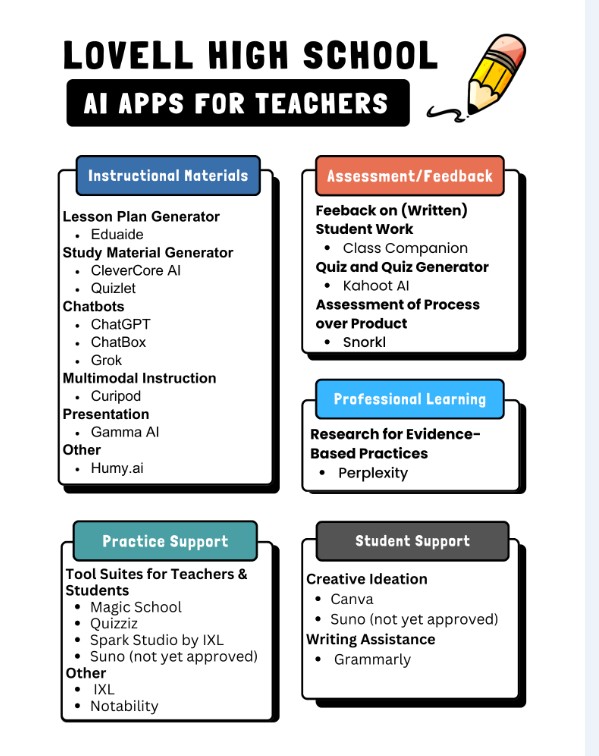AI in Education
Big Horn County School District #2 is integrating artificial intelligence (AI) to support student achievement, strengthen instructional practices, and equip students with skills for the future. This page outlines how AI is being used thoughtfully and effectively across our K–12 classrooms

What is AI in Education?
AI in education refers to computer systems, software, processes, and adaptive learning models that support learning in personalized, adaptive, and engaging ways. These tools are designed to work alongside teachers—not replace them—by enhancing instruction, improving student learning, and helping meet the diverse needs of all learners.
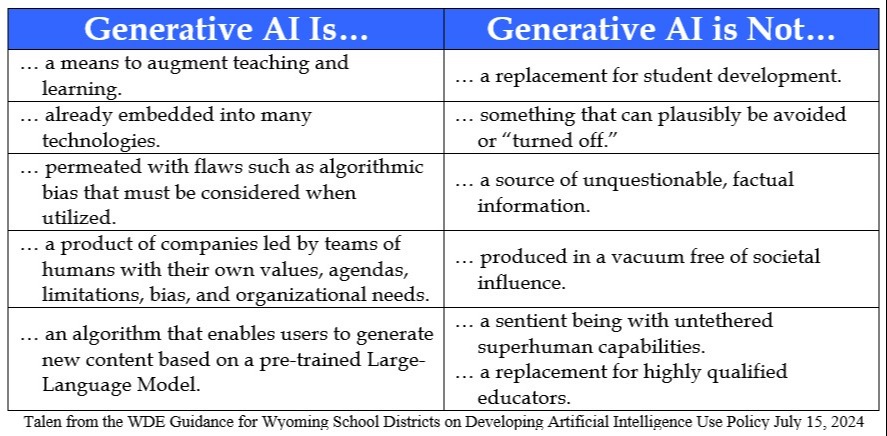

Frequently Asked Questions
Q: How will AI change my child's education?
A: AI can offer personalized learning experiences by adapting to each child's pace, learning style, and interests. It can also provide automated grading and instant feedback, freeing up teacher time for more direct student engagement. AI can also aid in research, brainstorming, and making complex concepts more accessible with tools that turn text into interactive content.
Q: Should I worry about my child cheating with AI?
A: This is a major concern for both parents and educators. While AI can aid learning, students may misuse it to complete assignments. You can help by having open conversations about academic integrity and discussing when and how AI tools can be used responsibly for schoolwork.
Q: Will AI replace my child's teachers?
A: No. Most experts and educators view AI as a tool to support teachers, not replace them. By automating administrative tasks like lesson planning and grading, AI allows teachers to focus more on instruction, mentorship, and building relationships with students.

How AI Supports Your Child's Learning
*AI tools can help teachers adjust lessons to match your child’s learning style and pace.
*Some AI tools offer 24/7 homework help and practice activities based on what your child needs.
*AI can help students who are learning English with translation and understanding tricky words.
*AI can help teachers assess student progress and adjust instruction to better support them.

A Parent's Role and AI
To discuss generative AI with kids, parents should foster open conversations, teach critical thinking to question AI's accuracy, set clear boundaries on usage, and help children understand AI is a tool, not a friend. Also, stay informed about AI, try the tools yourself, and emphasize online safety and ethical use to guide children in this evolving digital landscape.
5 Tips for Talking with Your Child About Generative AI
Foster Open Communication:
Show genuine curiosity: Ask your children what AI tools they use, why they like them, and how they interact with them.
Be a model: Try the AI tools yourself to understand the technology better and participate more effectively in conversations with your children about their digital world.
Promote Critical Thinking:
Question AI's output: Teach your kids that AI can be wrong or biased, even when it sounds convincing. Encourage them to ask questions like, "Is this true?" and "Where does this information come from?".
Verify information: Remind them that AI responses are not always accurate and that they should always check sources, just as they would with any information found online.
Set Healthy Boundaries and Online Safety:
AI is a tool, not a companion: Emphasize that AI chatbots are not real friends or therapists and should not be relied on for emotional support.
Maintain privacy: Warn children against sharing personal information with AI systems, as they are not equipped to handle sensitive data.
Use parental controls: Set limits on AI-related app usage and monitor their activities to ensure a balanced approach to technology.
Educate About AI's Capabilities and Limitations:
Explain the basics: Help them understand that AI learns from data and can generate creative outputs like stories, music, and art, but it does so based on the information it has been trained on.
Discuss limitations: Explain that AI can produce misinformation and lacks true understanding or emotions, which are uniquely human.
Emphasize Ethics and Human Connection:
Discuss responsible use: Talk about the ethical implications of using AI, ensuring it's used for good and not to create harmful or misleading content.
Prioritize human connections: Encourage and provide opportunities for real-life interactions and activities that build genuine connections and confidence, rather than letting AI take precedence

Privacy, Safety, and Data Security
Commitment to Ethical AI Use
Big Horn County School District #2 is committed to responsible AI use, balancing its benefits with student privacy and well
Protect Student Privacy: AI tools must comply with privacy laws, and no personal identifiable information (PII) will be entered into AI systems.
Promote Ethical Use: Students and staff will be educated on responsible AI usage, academic integrity, and ethical considerations.
Monitor & Evaluate: AI tools will be regularly assessed for their impact on student learning and equity.
Stay Informed: The district will remain up to date on AI advancements, legal requirements, and best practices.
BGH2 Policy EHAB : Artificial Intelligence Use Adopted 05/12/2025
Purpose: Artificial Intelligence (AI) technologies provide valuable educational opportunities for students and educators in our school district. This policy outlines the responsible and effective use of AI in our classrooms.
Educational Use: Approved AI technologies will be used to enhance teaching and learning, promote critical thinking, and support personalized learning.
Student Privacy: All AI technologies used in the classroom must comply with FERPA, COPPA, IDEA, CIPA and other relevant laws and regulations. Personally identifiable student information must never be entered into any AI system.
How You Can Help Protect Your Child From AI-Related Online Dangers
Stay Informed: Understand the AI Tools your child uses.
Communicate Openly: Have honest conversations about online activities.
Teach Skepticism: Remind your child that AI may not always give correct or safe advice and to question the authenticity of what they see online.
Encourage Reporting: Teach them to report suspicious or uncomfortable encounters.

Building an AI-Ready District
Vision and Goals
The district will establish and update policies addressing student privacy, equity, transparency, and responsible AI use while aligning with existing board policies and technology agreements.
Goals for AI in K-12 Education
Enhance Personalized Learning – Use AI to tailor instruction and provide real-time feedback.
Support Diverse Educational Needs – Offer differentiated instruction and equitable access to resources.
Prepare Students for a Tech-Driven Future – Integrate AI literacy, digital skills, and ethical considerations into the curriculum.
Develop Critical Thinking Skills – Teach students to evaluate information, recognize bias, and apply ethical reasoning.
Empower Digital Citizens – Educate students on AI algorithms, media literacy, and online responsibility.
These goals will be reviewed and updated regularly to align with AI advancements.
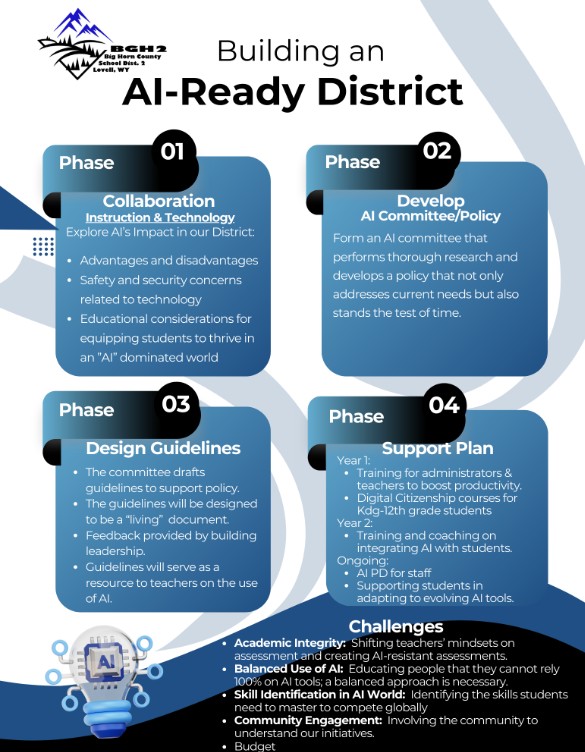
District/Building Approved AI Technologies
